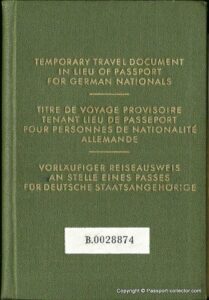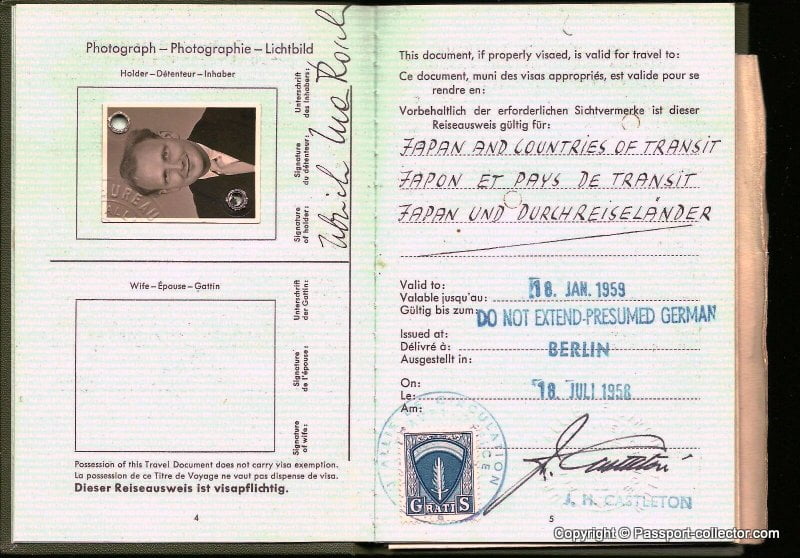The passport of a STASI unofficial collaborator – Code name PRIMUS
The passport of a STASI unofficial collaborator – Code name PRIMUS
This is the passport was issued to Ulrich Makosch (born March 17, 1933, in Wittenberg, † May 16, 2008, in Berlin), a German journalist. He was deputy editor-in-chief of the current camera and member of the SED district administration Berlin.

From 1965 to 1971, Makosch was the correspondent of broadcasting and television of the GDR in Asia, mainly in Jakarta and Singapore. During this time he wrote travelogues about Asian countries, e.g., about the coup in Indonesia and later of the Vietnam War. From 1972 to 1975 he was deputy editor-in-chief for reports and documentation at the DFF, after which he was deputy editor-in-chief of the Current Camera until 1990. Ulrich Makosch also moderated some issues of the political-agitational program The Black Channel. Since the 1950s he was a secret informer or unofficial employee observation of the GDR state security with the code name “Primus.” From 1978 to 1989 Makosch was a member of the SED district administration Berlin and from 1978 to 1990 President of the Friendship Society DDR Mozambique. In 1990 he retired. From 1990 to 1991 he worked for the American television company CNN. The passport of a STASI unofficial collaborator – Code name PRIMUS
From 1955 till 1956 he worked as an editor for the local radio station in Schwerin. He then, from 1956 till 1964, worked as an editor and travel correspondent for the country’s national broadcasting committee, a committee modeled on its Soviet equivalent that controlled the radio, and increasingly television broadcasting. From 1965 till 1971 Makosch worked as a chief foreign correspondent for the East German Television Corporation, focused on south-east Asia and based, for much of the time, in Djakarta and Singapore. He also wrote reports about the region, notably about the 1965 putsch in Indonesia and, later, about the Vietnam war, and published numerous books on these and related topics. From 1972 till 1975 he was deputy chief editor for reportage and documentary with the television company, after which, for fifteen years till 1990, he was deputy chief editor of the long-running news program (viewed in some quarters as a “propaganda tool”) Aktuelle Kamera. For many years he also fronted Objektiv, a weekly political television program focused on foreign policy concerns and issues. In 1990/1991 he worked for CNN.
From 1978 till 1989 he served as a member of the Berlin district party leadership. He served on the GDR-Mozambique Friendship Committee between 1978 and 1990. He became also a volunteer member of the Society for the Protection of Civil Rights and Human Values, an organisation established following German reunification by members of the former East German establishment, including lawyers, scientists and State Security officers/collaborators in response to concerns that they might face gratuitous hostility or injustice because of things alleged to have happened under the old East German regime.
After 1990 it transpired that he had served the Ministry for State Security since the 1950s as a secret informer, recorded in the Stasi files from 1969 under the code name “IMB Primus”.


FAQ Passport History
Passport collection, passport renewal, old passports for sale, vintage passport, emergency passport renewal, same day passport, passport application, pasaporte passeport паспорт 护照 パスポート جواز سفر पासपोर्ट
1. What are the earliest known examples of passports, and how have they evolved?
The word "passport" came up only in the mid 15th Century. Before that, such documents were safe conducts, recommendations or protection letters. On a practical aspect, the earliest passport I have seen was from the mid 16th Century. Read more...
2. Are there any notable historical figures or personalities whose passports are highly sought after by collectors?
Every collector is doing well to define his collection focus, and yes, there are collectors looking for Celebrity passports and travel documents of historical figures like Winston Churchill, Brothers Grimm, Johann Wolfgang von Goethe. Read more...
3. How did passport designs and security features change throughout different periods in history, and what impact did these changes have on forgery prevention?
"Passports" before the 18th Century had a pure functional character. Security features were, in the best case, a watermark and a wax seal. Forgery, back then, was not an issue like it is nowadays. Only from the 1980s on, security features became a thing. A state-of-the-art passport nowadays has dozens of security features - visible and invisible. Some are known only by the security document printer itself. Read more...
4. What are some of the rarest and most valuable historical passports that have ever been sold or auctioned?
Lou Gehrig, Victor Tsoi, Marilyn Monroe, James Joyce, and Albert Einstein when it comes to the most expensive ones. Read more...
5. How do diplomatic passports differ from regular passports, and what makes them significant to collectors?
Such documents were often held by officials in high ranks, like ambassadors, consuls or special envoys. Furthermore, these travel documents are often frequently traveled. Hence, they hold a tapestry of stamps or visas. Partly from unusual places.
6. Can you provide insights into the stories behind specific historical passports that offer unique insights into past travel and migration trends?
A passport tells the story of its bearer and these stories can be everything - surprising, sad, vivid. Isabella Bird and her travels (1831-1904) or Mary Kingsley, a fearless Lady explorer.
7. What role did passports play during significant historical events, such as wartime travel restrictions or international treaties?
During war, a passport could have been a matter of life or death. Especially, when we are looking into WWII and the Holocaust. And yes, during that time, passports and similar documents were often forged to escape and save lives. Example...
8. How has the emergence of digital passports and biometric identification impacted the world of passport collecting?
Current modern passports having now often a sparkling, flashy design. This has mainly two reasons. 1. Improved security and 2. Displaying a countries' heritage, icons, and important figures or achievements. I can fully understand that those modern documents are wanted, especially by younger collectors.
9. Are there any specialized collections of passports, such as those from a specific country, era, or distinguished individuals?
Yes, the University of Western Sidney Library has e.g. a passport collection of the former prime minister Hon Edward Gough Whitlam and his wife Margaret. They are all diplomatic passports and I had the pleasure to apprise them. I hold e.g. a collection of almost all types of the German Empire passports (only 2 types are still missing). Also, my East German passport collection is quite extensive with pretty rare passport types.
10. Where can passport collectors find reliable resources and reputable sellers to expand their collection and learn more about passport history?
A good start is eBay, Delcampe, flea markets, garage or estate sales. The more significant travel documents you probably find at the classic auction houses. Sometimes I also offer documents from my archive/collection. See offers... As you are already here, you surely found a great source on the topic 😉
Other great sources are: Scottish Passports, The Nansen passport, The secret lives of diplomatic couriers
11. Is vintage passport collecting legal? What are the regulations and considerations collectors should know when acquiring historical passports?
First, it's important to stress that each country has its own laws when it comes to passports. Collecting old vintage passports for historical or educational reasons is safe and legal, or at least tolerated. More details on the legal aspects are here...
Does this article spark your curiosity about passport collecting and the history of passports? With this valuable information, you have a good basis to start your own passport collection.
Question? Contact me...

